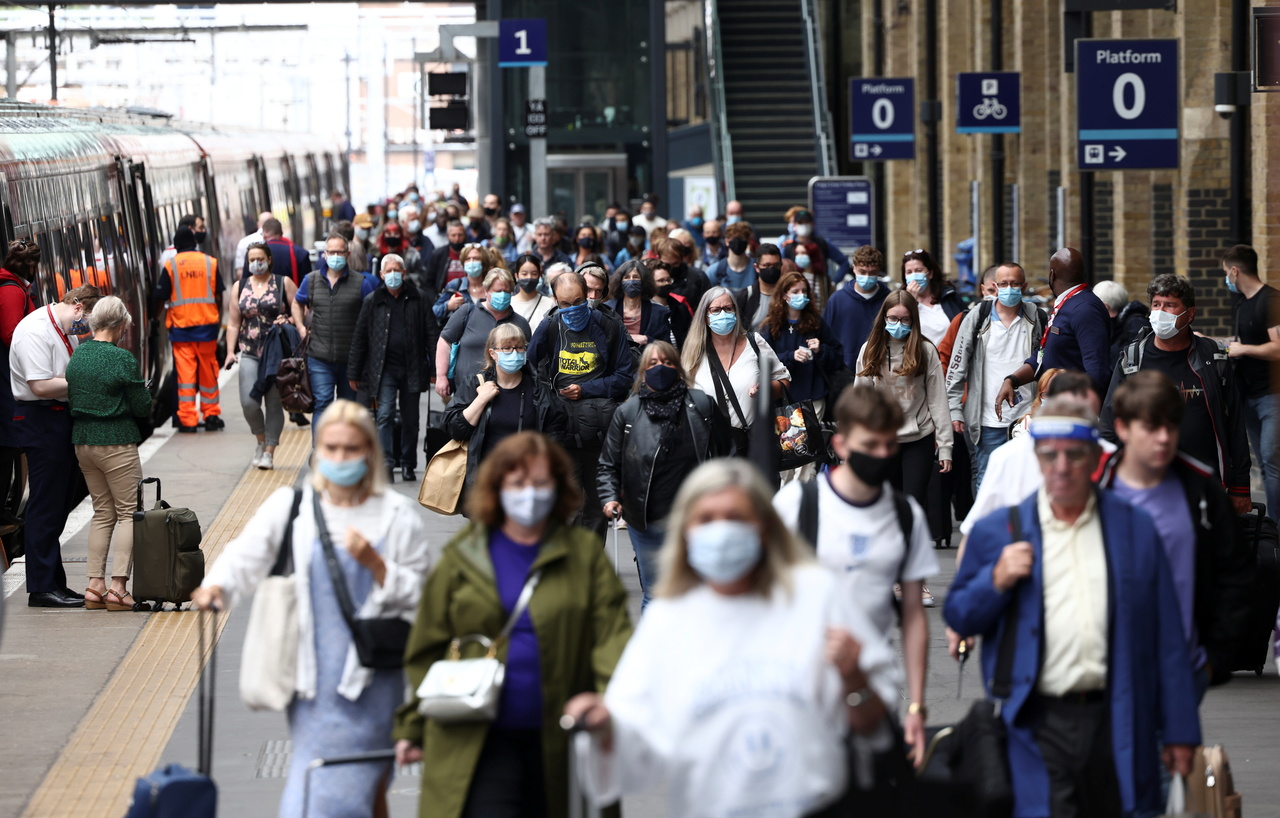Confusion reigns as Britain feels its way out of Covid-19 pandemic
Sign up now: Get ST's newsletters delivered to your inbox

For most of the country, the legal requirement to wear masks in public will be lifted from Monday.
PHOTO: REUTERS
LONDON - British Prime Minister Boris Johnson has confirmed that his government intends to remove all pandemic social distancing restrictions by next Monday (July 19).
"Freedom Day", as some politicians in London have dubbed, is "irreversible", according to Mr Johnson.
But most public health officials are warning that the abolition of pandemic safety measures is dangerous. And soaring infection numbers as well as last-minute warnings by the Prime Minister that "people should proceed with caution" are confusing many Britons about what to expect from the start of next week.
For most of the country, the legal requirement to wear masks in public will be lifted from Monday. All capacity limits on concerts, weddings and other social and public events will disappear and, for the first time in more than a year, nightclubs can open. Rules mandating social distancing of at least 1m between people will also go. And workers are - at least in theory - expected to return to their offices.
The British government admits that its policies are risky. Throughout this week, infection rates have exceeded 30,000 a day, and Health Secretary Sajid Javid told MPs that he expects the current rate will peak only next month, when projections estimate around 100,000 new cases of Covid-19 daily.
Mr Javid's assumption is that high rates of vaccinations will mean that soaring infection rates will not put pressure on the national health services.
Currently, 46 million Britons, or about 87 per cent of all adults, have received at least one vaccine dose, and more than 35 million - two-thirds of all adults - have benefited from both doses. The government is confident that by next Monday almost all adults would have had at least one jab, meeting a target Mr Johnson set for the nation at the start of this year.
The high rate of vaccination in Britain and evidence that scepticism or popular opposition to vaccines is among the lowest in the industrialised world have emboldened Mr Javid to claim that vaccines have created a "protective wall", which would mean Britain will "withstand a summer wave" of infections, as he told lawmakers in London this week.
The assumption is that, while many will fall ill, very few would require hospitalisation, and fewer still will face life-threatening conditions. Currently, the daily statistics of Covid-19-related deaths are in the double digits, a good performance for a 67 million-strong nation.
But the British Medical Association, the doctors' trade union, is vocal in its opposition to lifting mandatory restrictions.
"The Prime Minister repeatedly emphasised the importance of a slow and cautious approach, but in reality, the government is throwing caution to the wind by scrapping all regulations in one fell swoop - with potentially devastating consequences", the association warned.
And Professor Adam Finn, a member of the British government's own Joint Committee on Vaccination and Immunisation, warned there was "considerable uncertainty" as to how the virus will play out in the coming weeks, thereby implicitly rebutting Mr Javid's predictions that vaccines will limit hospitalisations and deaths.
Responding to the barrage of criticism, British ministers have begun to hedge their bets by suggesting that, while compulsory measures will disappear, people should still exercise caution voluntarily.
Quarantine will remain mandatory for those infected, and nightclubs or other large venue organisers are "encouraged" to demand proof of vaccination from their customers, with the government saying it "reserves the right" to impose such demands should this be necessary.
The authorities also say that, although masks will no longer be legally required, people are "expected and recommended" to use them in public places.

The mayor of London, a member of the opposition Labour party, has already mandated the continued use of masks on the British capital's underground train system, which effectively means that millions will still need to wear them.
And to add to the confusion, although working from home arrangements are no longer necessary from next Monday, the government is advising "those who can" to "continue working from their homes".
Such mixed advice is exasperating employers. "Business leaders aren't public health experts and cannot be expected to know how best to operate when confusing and sometimes contradictory advice is coming from official sources," said Ms Claire Walker, a director with the British Chambers of Commerce.
Yet confusion is the name of the game now, for the entire exercise is based on a set of suppositions which have yet to be tested.
If the British experiment succeeds in opening the national economy with minimum casualties, this will inspire other countries to guide their own way out of lockdowns.
But if it fails, politicians in London hope that their less than clear position means they will not have to shoulder all the blame.


